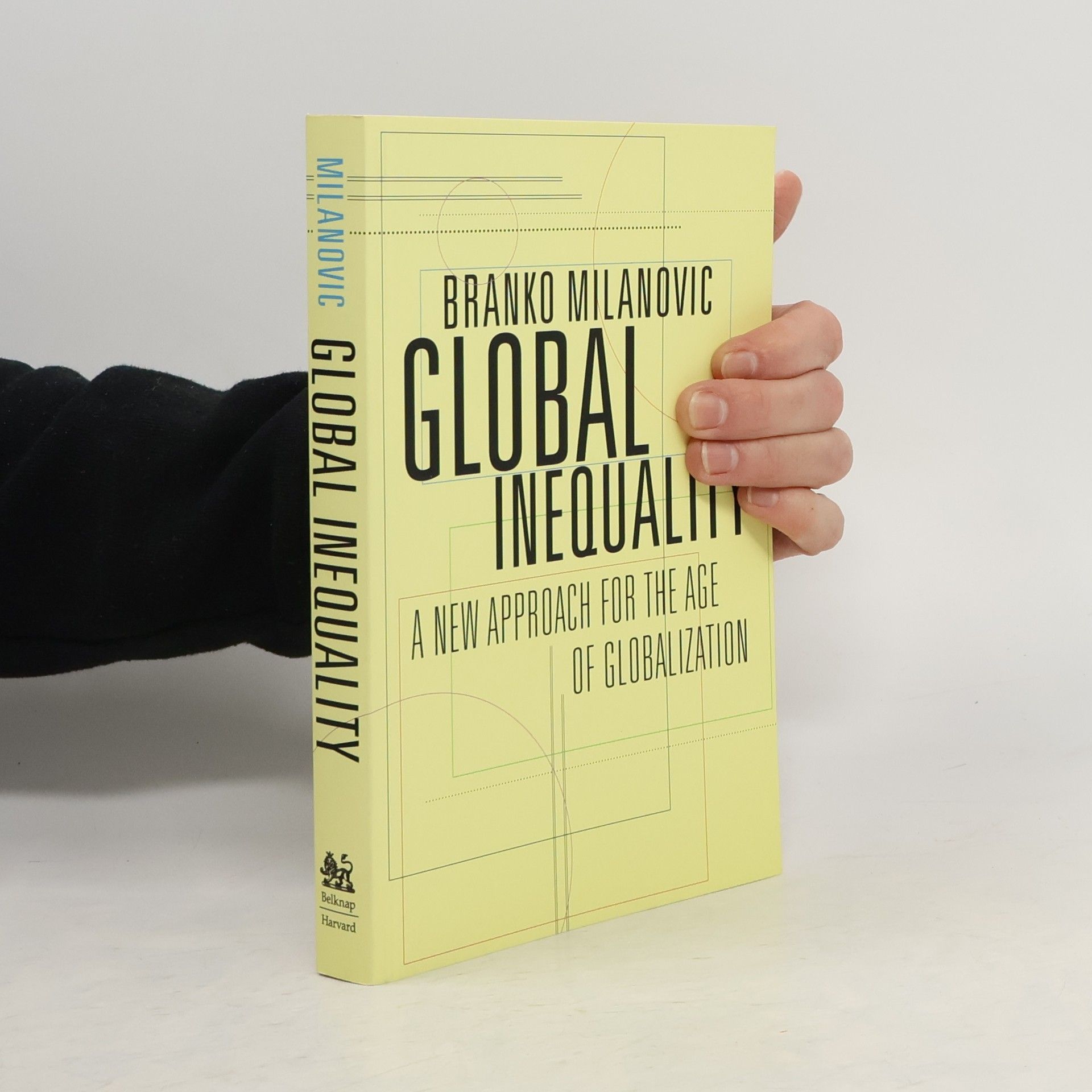Poprvé v lidských dějinách celé planetě dominuje jeden ekonomický systém. Kapitalismus triumfoval, protože se ukázal životaschopnější a adaptabilnější než systémy jiné. Přinesl lidem blahobyt a uspokojil jejich touhu po nezávislosti. Ale vyžádal si za to vysokou morální cenu, naučil nás považovat materiální úspěch za konečný cíl našeho jednání. Kapitalismus sám o sobě nenabízí záruku stability. Na Západě je k prasknutí napínán nerovností a nadbytkem. V Číně dobývá srdce milionů obyvatel a na první pohled se zdá, že funguje efektivněji než na Západě. Je však mnohem náchylnější ke korupci a při zpomalení růstu může vyvolávat ničivé sociální nepokoje. Proroctví předpovídající jednu jedinou nevyhnutelnou budoucnost lidstva jsou lichá. Kapitalismus je systémem plným rizik, ale je systémem lidským: bude nám sloužit tím lépe, čím jasněji si budeme vědomi svých rozhodnutí.
Branko Milanović Knihy
Branko Milanović je významný ekonóm známy svojím priekopníckym výskumom v oblasti distribúcie príjmov a globálnej nerovnosti. Jeho práca sa ponára do zložitých vzorcov majetkových rozdielov medzi národmi a v priebehu času, pričom ponúka hlboké poznatky o ekonomických silách formujúcich náš svet. Milanovićova rigorózna analýza a jasný štýl písania sprístupňujú zložité ekonomické koncepty širokému publiku, čím upevňujú jeho reputáciu ako popredného hlasu v súčasnom ekonomickom myslení.






Capitalism, Alone
- 272 stránok
- 10 hodin čítania
For the first time in history, the globe is dominated by one economic system. Capitalism prevails because it delivers prosperity and meets desires for autonomy. But it also is unstable and morally defective. Surveying the varieties and futures of capitalism, Branko Milanovic offers creative solutions to improve a system that isn't going anywhere.
Branko Milanovic charts 200 years of the fascinating history of the discourse on inequality through portraits of six key economists, from Quesnay to Kuznets. In their work and lives, we see how differently each conceived of inequality, and how the subject, prominent in their times, was eclipsed during the Cold War and has become central once again.
Global inequality : a new approach for the age of globalization
- 320 stránok
- 12 hodin čítania
Winner of the Bruno Kreisky Prize, Karl Renner Institut A Financial Times Best Economics Book of the Year An Economist Best Book of the Year A Livemint Best Book of the Year One of the world’s leading economists of inequality, Branko Milanovic presents a bold new account of the dynamics that drive inequality on a global scale. Drawing on vast data sets and cutting-edge research, he explains the benign and malign forces that make inequality rise and fall within and among nations. He also reveals who has been helped the most by globalization, who has been held back, and what policies might tilt the balance toward economic justice. “The data [Milanovic] provides offer a clearer picture of great economic puzzles, and his bold theorizing chips away at tired economic orthodoxies.” —The Economist “Milanovic has written an outstanding book...Informative, wide-ranging, scholarly, imaginative and commendably brief. As you would expect from one of the world’s leading experts on this topic, Milanovic has added significantly to important recent works by Thomas Piketty, Anthony Atkinson and François Bourguignon...Ever-rising inequality looks a highly unlikely combination with any genuine democracy. It is to the credit of Milanovic’s book that it brings out these dangers so clearly, along with the important global successes of the past few decades. —Martin Wolf, Financial Times
The Haves and the Have-Nots
- 280 stránok
- 10 hodin čítania
A wonderful new book, Milanovic, who has made international inequality his life's work, shows, with devastating logic, just how far we still have to go.', Globe and Mail (Toronto)
Kapitalismus global
Über die Zukunft des Systems, das die Welt beherrscht
Zum ersten Mal in der Geschichte dominiert ein einziges Wirtschaftssystem den Globus. Von Peking bis Porto Alegre: Ob es uns gefällt oder nicht, heute sind wir alle Kapitalisten. Das Mantra der Alternativlosigkeit gehört längst zum rhetorischen Standardrepertoire von Politikern jeder Couleur. Warum konnte sich der Kapitalismus gegen den Kommunismus durchsetzen? Wie steht es um die Aussichten auf eine gerechtere Welt, nun, da seine Vorherrschaft ohne Konkurrenz ist? Spätestens seit der Finanzkrise zeichnet sich ab, dass zwei Ausprägungen im Wettstreit miteinander liegen: ein liberaler Kapitalismus, der mit rechtsstaatlichen Prinzipien und Demokratie einhergeht, und ein autoritärer, in dem Vetternwirtschaft und politische Willkür an der Tagesordnung sind. Wenn es nicht gelingt, so Milanović, Herausforderungen und Probleme wie Ungleichheit, Migration oder Korruption zu meistern, ist nicht nur die liberale Wirtschaftsordnung, sondern auch die Demokratie in Gefahr. Aber der Kapitalismus ist ein von Menschen gemachtes System: Unsere Entscheidungen bestimmen, welche Form er in Zukunft annimmt.
Alle reden von Ungleichheit, seitdem der Mittelstand schrumpft und die Schere zwischen Arm und Reich größer wird. Doch stimmt das wirklich: Führt Kapitalismus zwangsläufig zu Ungleichheit? Wie müssen wir dann die Wohlstandsphase nach dem Zweiten Weltkrieg verstehen? Branko Milanovic zählt zu den weltweit führenden Experten zur Einkommensverteilung und war lange Jahre leitender Ökonom der Weltbank. Seine These: Im Kapitalismus kann es beides geben, Phasen von Ungleichheit wie von Gleichheit. Und doch müssen wir heute dringend etwas tun. Nur: Was sind zeitgemäße Mittel? Milanovic hat die globalen und historischen Zusammenhänge im Blick. Was können wir uns, verglichen mit den reichen Mittelschichten in China oder armen Mittelschichten in Afrika, tatsächlich leisten? Und war Nero reicher als Bill Gates? Ohne ideologische Scheuklappen und mit viel Humor erklärt er die ökonomischen Hintergründe der Diskussion über die Zukunft unserer Gesellschaft.
Die ungleiche Welt
- 312 stránok
- 11 hodin čítania
1760000000000 US-Dollar – eine Summe, die das Vermögen der 62 wohlhabendsten Menschen der Welt repräsentiert. Oxfam schätzt, dass diese Milliardäre so viel besitzen wie die ärmere Hälfte der Weltbevölkerung. Die führenden Köpfe unserer Zeit, darunter Barack Obama und Thomas Piketty, erkennen Ungleichheit als eines der drängendsten Probleme an. Branko Milanović untersucht anhand neuer, haushaltsbasierter Daten die Ursachen und Folgen der Ungleichheit differenziert. Er zeigt, dass der Abstand zwischen armen und reichen Staaten zwar abgenommen hat, das Gefälle innerhalb einzelner Nationen jedoch dramatisch gewachsen ist. Armut und Perspektivlosigkeit treiben internationale Migration an, und das Geburtsland eines Kindes bleibt entscheidend für dessen zukünftiges Einkommen. Milanović analysiert den Zusammenhang zwischen Ungleichheit und Migration und fordert ein radikal liberales Einwanderungsrecht. Dieses engagierte Buch wird die Perspektive auf unsere ungleiche Welt verändern. „Absolute Pflichtlektüre“, sagt Thomas Piketty, während Barack Obama betont, dass Ungleichheit die entscheidende Herausforderung unserer Zeit ist. Angus Deaton, Wirtschaftsnobelpreisträger, hebt hervor, dass dieses Werk Milanovićs Ruf als einen der klügsten Forscher im Bereich der Ungleichheit festigen wird.
Visionen der Ungleichheit
Von der Französischen Revolution bis zur Gegenwart | Eine brillante Reflexion über soziale Ungleichheit | Bietet beste wirtschaftswissenschaftliche Aufklärung
Branko Milanovic untersucht in seinem neuen Buch die Entwicklung des Denkens über Ungleichheit durch die Jahrhunderte und die einflussreichsten Ökonomen. Er zeigt, wie Ansichten von Quesnay über Smith, Marx bis Kuznets variierten und beleuchtet die zeitlichen und räumlichen Kontexte, die diese Analysen prägten. Ein faszinierender Einblick in die Geschichte der Ungleichheitsforschung.

